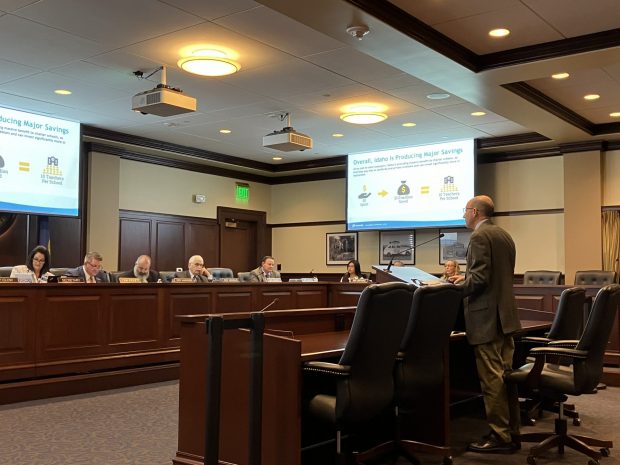Idaho’s charter school facilities funding model is a “success story” that other states should follow, a policy adviser for a national school choice advocacy group told lawmakers Monday.
In 2023, the Legislature passed two bills that helped charters obtain short- and long-term financing for facilities. One bill created a $50 million revolving loan fund to jumpstart newer charters, while the other offered state-backed credit enhancement to established charters, lowering their interest rates on bonds.
These financing tools cost the state nothing on an ongoing basis and they’ve saved $113 million, Matthew Joseph, senior policy adviser at ExcelinEd, told the House Education Committee.
“It means that every charter school in Idaho is able to reinvest the money … into instruction,” Joseph said. “… I work in states all over the country that are not nearly as advanced as Idaho is.”
Unlike traditional public school districts, Idaho’s charter schools can’t levy taxes on patrons to raise funds for facilities. Instead, they leverage state facilities dollars along with bonds and private donations to finance capital projects.

On top of the financing tools, the state gives charters a per-student allocation for facilities costs. The per-student amount decreased, from $400 to $300, with last year’s House Bill 521, the sweeping facilities funding bill that directed $1.5 billion to traditional districts.
Charter advocates are preparing to introduce a proposal restoring these funds. Blake Youde, a lobbyist for the Idaho Charter School Network, told the House Education Committee that HB 521 eliminated about $3 million in state lottery funds for charters.
“I anticipate that we will be trying to work with you to make charter schools whole again,” Youde said.
Traditional districts lost lottery funding to the tune of $29 million. The Idaho School Boards Association also called for restoring these funds, which traditional districts used for routine maintenance costs and staff salaries.
‘Unfinished work:’ Liebich makes pitch for second State Board term
Kurt Liebich was first appointed to the State Board of Education in February 2020 — weeks before the COVID-19 pandemic shuttered schools across the state and the nation.
“When I signed up five years ago, what I was getting into was not at all what I thought I was getting into,” Liebich said Monday.
On Monday afternoon, the Boise businessman was back before the Senate Education Committee, seeking confirmation to a second five-year State Board term.
Liebich said he decided to seek a second term to focus on “unfinished work,” especially in K-3 literacy, middle school math and preparing high school graduates for college or career.
“Within K-12 you’ve made massive investments in education,” Liebich said. “We could and we should get a return on the investment.”

Over the past five years, Idaho’s K-12 budget has increased by nearly 40%.
The committee took no action on Liebich’s appointment. The committee will likely vote later this week, said Senate Education Chairman Dave Lent, R-Idaho Falls.
The nomination will then go to the full Senate.
At least two other State Board nominations are likely to go through Senate Education.
- David Turnbull, an Eagle developer, was appointed to the State Board in October, replacing David Hill. But that nomination is subject to Senate confirmation.
- The committee will also get a chance to question State Board Executive Director Joshua Whitworth, who Gov. Brad Little hired in June. A 2024 state law gave the Senate the authority to confirm a State Board executive director.
